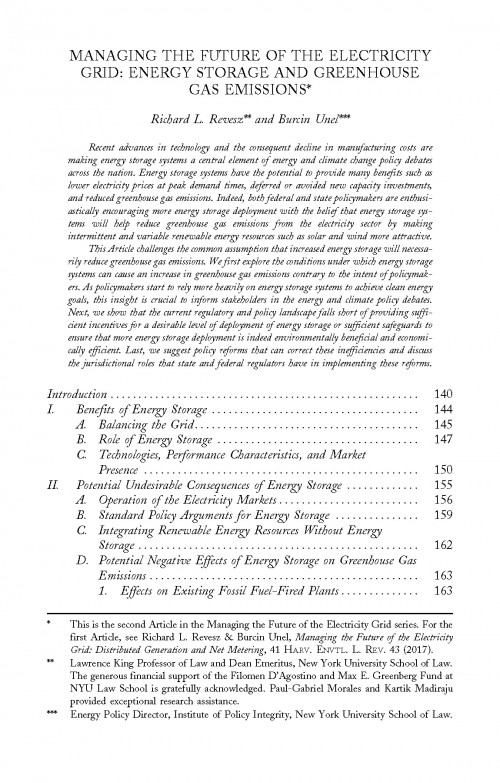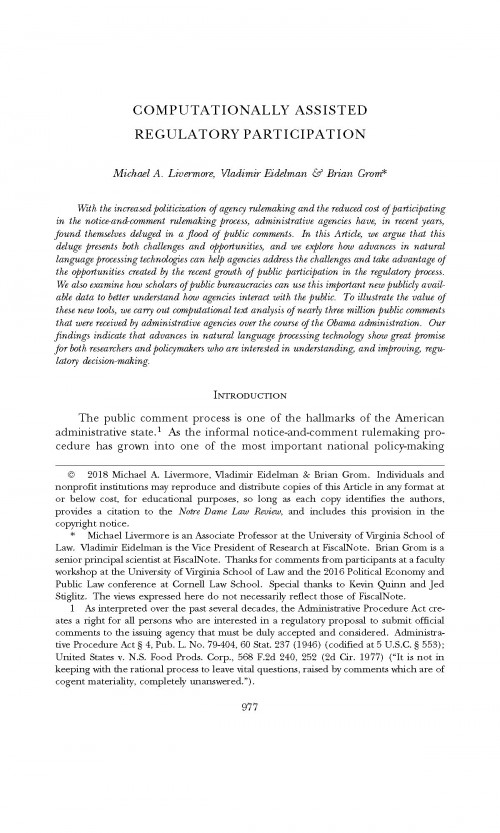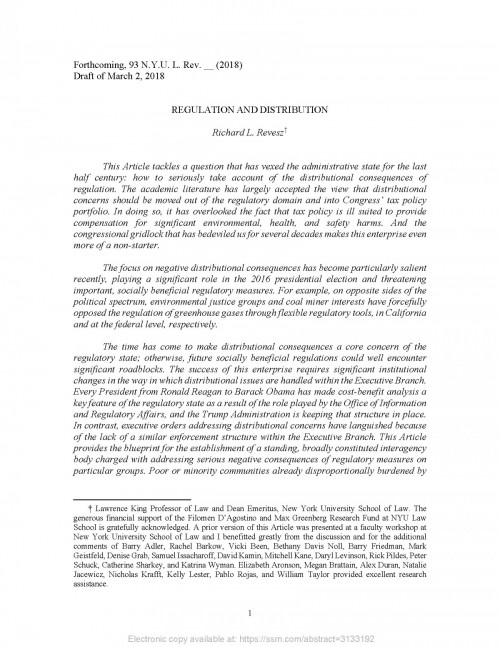-

Managing the Future of the Electricity Grid: Energy Storage and Greenhouse Gas Emissions
Recent advances in technology and the consequent decline in manufacturing costs are making energy storage systems a central element of energy and climate change policy debates across the nation. Energy storage systems have the potential to provide many benefits such as lower electricity prices at peak demand times, deferred or avoided new capacity investments, and reduced greenhouse gas emissions. Indeed, both federal and state policymakers are enthusiastically encouraging more energy storage deployment with the belief that energy storage systems will help reduce greenhouse gas emissions from the electricity sector by making intermittent and variable renewable energy resources such as solar and wind more attractive. This article, published in the Harvard Environmental Law Review, challenges this common assumption that increased energy storage will necessarily reduce greenhouse gas emissions.
The article was selected by Environmental Law Reporter as one of the five best environmental law articles published during the 2018-2019 academic year. An adapted version, The Future of Energy Storage: Adopting Policies for a Cleaner Grid, was included in the August 2019 Environmental Law and Policy Annual Review issue of Environmental Law Reporter’s News & Analysis.
-

Computationally Assisted Regulatory Participation
With the increased politicization of agency rulemaking and the reduced cost of participating in the notice-and-comment rulemaking process, administrative agencies have, in recent years, found themselves deluged in a flood of public comments. In this article, published in the Notre Dame Law Review, the authors argue that this deluge presents both challenges and opportunities, and they explore how advances in natural language processing technologies can help agencies address the challenges and take advantage of the opportunities created by the recent growth of public participation in the regulatory process.
-

Regulation and Distribution
Most regulations seek to improve social welfare, but maximizing overall welfare may not help or protect all groups evenly. Many economists suggest handling unequal regulatory effects through the tax system. But some harms—like the disproportionately high environmental pollution felt by poor and minority communities and loss of the employment base in rural communities due to shifts in the economy—cannot be addressed by monetary compensation alone. A new article by Richard Revesz, published in the NYU Law Review, offers a blueprint for establishing a standing, broadly constituted interagency body charged with addressing serious negative consequences of regulatory measures on particular groups.
-
Mineral Royalties: Historical Uses and Justifications
Published in the Duke Environmental Law & Policy Forum
Governments and private landowners have collected royalties on mineral resources for centuries. When comprehensive measures to account for the environmental externalities of mineral extraction are politically or practically unavailable, federal and state governments may consider adjusting royalty rates as an expedient way to account for these externalities and benefit society. One key policy question that has not received attention, however, is whether a royalty rate can and should be manipulated in this way, assuming statutory discretion to do so.
This article, published in the Duke Environmental Law & Policy Forum, fills that gap by evaluating the argument for increasing federal or state fossil fuel royalty rates through historical, theoretical, and practical lenses. To that end, this article in turn considers the meaning of royalties, the economic justifications for royalties, the legislative history of the implementation of federal royalties, and the considerations that private landowners have relied upon in setting royalties. This article concludes that it would be appropriate for governments to adjust mineral royalty rates to account for negative externalities not otherwise addressed by regulation or to otherwise promote public welfare. Such use of royalties is consistent with the historical record. Royalties have been used as pragmatic policy tools from almost their inception, and federal and state governments have often exercised their existing statutory discretion to adjust mineral royalty rates to promote public welfare.
-
The Environment in the Atomic Age
Scholars date the start of the “Anthropocene” period, during which human activity began to have substantial effects on the environment, variously from the beginning of human farming roughly 8,000 years ago to the emergence of industrialism in the 19th century. But all agree that the advent of nuclear weapons and power has dramatically changed the potential for environmental alterations. Our ongoing attempts to harness the benefits of the atomic age while lessening its negative impacts will need to confront the substantial environmental and public-health issues that have plagued nuclear technology since its inception.
Viewing all publications in Academic Articles/Working Papers

